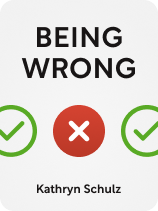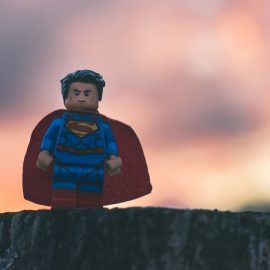

This article is an excerpt from the Shortform book guide to "Being Wrong" by Kathryn Schulz. Shortform has the world's best summaries and analyses of books you should be reading.
Like this article? Sign up for a free trial here.
Why is it so hard to admit when you’re wrong? What if there were a way to make this process easier and more beneficial?
In her book Being Wrong, Kathryn Schulz explores the concept of error and how to accept being wrong. She offers insights on embracing uncertainty, dealing with change, and viewing mistakes as opportunities for growth.
Read more to discover how to accept being wrong and turn the experience into a positive one.
Accepting That You’re Wrong
Though Schulz often claims that not all mistakes are bad, responding to them poorly never ends well, and the results of denial can sometimes be disastrous. Whether it’s minor or major in scope, the healthiest way to deal with a mistake is to accept it and use it to grow. To be ready for this, you have to be open to the possibility that you can be wrong, acknowledge that your beliefs are always changing, and face up to the fact that learning how to accept being wrong is a never-ending struggle.
The upside of learning you’ve been wrong about something is that it opens you up to change and exploration. First, however, Schulz recommends that you cultivate an openness to the chance you could be wrong about a great many things. The manufacturing industry already models this by thinking through every possible way the systems they design might fail. On a personal level, you can start to practice this by using the language of equivocation—“maybe, possibly, I’m not sure”—instead of speaking and thinking from a place of certainty. Our culture paints uncertainty as weakness, but that’s just another way that our culture may be wrong. Uncertainty helps you stay open to error and cushions the blow of admitting to mistakes.
(Shortform note: Schulz isn’t the only author to recommend doubt as a pathway to growth. In The Subtle Art of Not Giving a F*ck, Mark Manson offers a three-step process to cultivating doubt as a practical skill. The first step is to ask yourself what if you’re wrong in any particular situation. The follow-up question is “What would the consequences be if you’re wrong?” The last step is to think about those consequences. None of Manson’s steps require admitting that you’re wrong—Manson, like Schulz, only asks that you leave the option on the table and do the mental work to take it seriously.)
To be sure, if you learn that you’ve been wrong in a way that’s fundamental to your sense of self—something that might change your religious beliefs or whether you want to continue in your career—you’re going to go through a painful transition. Nevertheless, Schulz points out that our identities, based on our changeable beliefs, are always in flux. Change is a natural, if painful, part of life that we all experience in one way or another. It may be easier for such change to happen slowly, but there’s always a sense of loss associated with it. The trick is to change your attitude toward being wrong so that you can see it for the lessons that it brings instead of the pain it makes you feel.
(Shortform note: Since Schulz defines right and wrong in terms of change instead of truth, then the entire question of making peace with your mistakes is really a question of how well you handle change. In Switch, Chip and Dan Heath make the case that change can be successfully managed if you engage both your rational side and your emotions. You can guide your intellect through difficult changes by seeking out the stories of those who’ve gone through a similar experience while leveraging both positive and negative feelings to push change forward, depending on the context of your situation. Above all, they recommend making sure to celebrate progress along your path toward change rather than regretting the mistakes that came before.)
The final problem with admitting you’re wrong and adopting a different set of beliefs is dealing with the chance that you might still be wrong. Schulz writes that correcting your mistakes is a never-ending process, and unless you stumble on an absolute truth, you’ll have to deal with being wrong for the rest of your life. So is there a point in even trying? Of course! Not only is there value on the path of self-improvement, even if it’s a journey with no end, being open to your own capacity for error teaches you to be compassionate toward other people and the unique mistakes they make. The more that people can accept their own errors, the more open they are to new beliefs and ideas, and the more they can see the world through someone else’s eyes.
(Shortform note: An author who embodies the process of change that Shulz describes is British radio host James O’Brien. In How Not to Be Wrong, O’Brien explains how a personal crisis led him to re-examine the culture of toughness and physical violence that shaped the views he espoused on his program. O’Brien realized that what he came to see as his very wrong beliefs about racism, shaming others, and mistreating children not only affected his personal life, but negatively impacted other people through his show. O’Brien concluded that his misconceptions were the result of his childhood trauma, and by following a path such as Schulz recommends, he now advocates for being vulnerable and showing compassion to others.)
Exercise: How Well Do You Handle Being Wrong?
Schulz writes that being wrong and making mistakes is something that, as fallible humans, all of us will experience in our lives. No doubt you can remember mistakes in your past, but it’s also unavoidable that something you believe at this moment isn’t true. Consider, for a moment, how you normally react to finding out (or being told) that you’re wrong and whether you think there’s a way to react better.
- Think of an error in judgment you’ve made at some point in your life. What did it feel like when you learned of your mistake? What was your initial reaction, and has your perspective on it changed over time?
- Describe an incident in your life when you were glad to have been proven wrong about something. How did you react when you found out your mistake? Do you feel that being wrong in this instance was better or worse for you than being right would have been, and why?
- Name something that you believe strongly at this moment. How would you feel if that belief was overturned? Given that any belief may be wrong, what can you do to prepare yourself for the possibility it might happen in this case?

———End of Preview———
Like what you just read? Read the rest of the world's best book summary and analysis of Kathryn Schulz's "Being Wrong" at Shortform.
Here's what you'll find in our full Being Wrong summary:
- Why you shouldn’t try to completely avoid making mistakes
- The reasons why you get things wrong
- How to make mistakes without falling victim to shame and denial






